初中英语-疑问句
初中英语知识点归纳疑问句的分类和用法

初中英语知识点归纳疑问句的分类和用法在初中英语学习中,疑问句是非常重要和常用的语法结构之一。
掌握各种疑问句的分类和用法,可以帮助我们更准确地提问和理解他人的问题。
本文将就初中英语知识点归纳疑问句的分类和用法展开论述。
一、一般疑问句一般疑问句是用来征询基本事实的疑问句,其基本句型结构为:助动词(或be动词)+主语+谓语(其余成分)。
疑问句通常以问句形式结尾,例如:"Do you like swimming?"(你喜欢游泳吗?), "Is she a doctor?"(她是医生吗?)。
二、特殊疑问句特殊疑问句用于征询对特定信息或事实的询问,常用的特殊疑问句包括:疑问词(who, what, when, where, why, how等)+一般疑问句句型。
以下是常见的特殊疑问句的用法:1. What:用于询问事物、活动或情况。
- What's your favorite color?(你最喜欢的颜色是什么?)- What do you want to be in the future?(你将来想成为什么?)2. Where:用于询问地点或位置。
- Where is the nearest bus stop?(最近的公交车站在哪里?)- Where did you go for your last vacation?(你上次去了哪里度假?)3. When:用于询问时间或日期。
- When is your birthday?(你的生日是什么时候?)- When did you start learning English?(你何时开始学英语?)4. Who:用于询问人物身份或者做某事的人。
- Who is your best friend?(你最好的朋友是谁?)- Who wrote the book "Pride and Prejudice"?(谁写的《傲慢与偏见》?)5. Why:用于询问原因或理由。
初中英语疑问句讲解
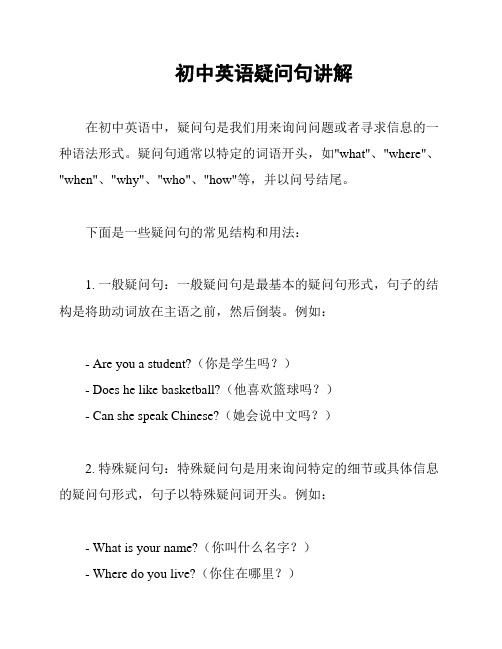
初中英语疑问句讲解在初中英语中,疑问句是我们用来询问问题或者寻求信息的一种语法形式。
疑问句通常以特定的词语开头,如"what"、"where"、"when"、"why"、"who"、"how"等,并以问号结尾。
下面是一些疑问句的常见结构和用法:1. 一般疑问句:一般疑问句是最基本的疑问句形式,句子的结构是将助动词放在主语之前,然后倒装。
例如:- Are you a student?(你是学生吗?)- Does he like basketball?(他喜欢篮球吗?)- Can she speak Chinese?(她会说中文吗?)2. 特殊疑问句:特殊疑问句是用来询问特定的细节或具体信息的疑问句形式,句子以特殊疑问词开头。
例如:- What is your name?(你叫什么名字?)- Where do you live?(你住在哪里?)- When is the party?(派对是什么时候?)- Why did she cry?(她为什么哭了?)- How did they win the game?(他们是如何赢得比赛的?)3. 选择疑问句:选择疑问句是用来在两个或多个选项之间做出选择的疑问句形式。
句子以"or"连接不同的选项。
例如:- Do you want coffee or tea?(你想要咖啡还是茶?)- Are you going by car or by bus?(你是坐车还是坐公交?)4. 否定疑问句:否定疑问句是用来提出带有否定意义的问题的疑问句形式。
句子通常以"don't"或"doesn't"开头。
例如:- Don't you like pizza?(你不喜欢比萨吗?)- Doesn't she have a dog?(她没有狗吗?)总结:初中英语中的疑问句结构和用法有多种类型,包括一般疑问句、特殊疑问句、选择疑问句和否定疑问句。
初中英语一般疑问句和特殊疑问句

初中英语一般疑问句和特殊疑问句一、一般疑问句1. 定义- 一般疑问句是用来询问事物或情况是否属实的句子,通常以助动词(如be动词、do/does、have/has等)或情态动词(如can、may、must等)开头,回答时用yes或no。
2. 结构- be动词(am/is/are/was/were)开头的一般疑问句- 肯定句:He is a student.- 一般疑问句:Is he a student?(将be动词提前,句末加问号)- 回答:Yes, he is. / No, he isn't.- 含有实义动词(do/does/did)的一般疑问句(一般现在时和一般过去时) - 肯定句:She likes apples.(一般现在时,主语是第三人称单数,动词用likes)- 一般疑问句:Does she like apples?(借助助动词does,原动词likes变为原形like)- 回答:Yes, she does. / No, she doesn't.- 肯定句:They played football yesterday.(一般过去时)- 一般疑问句:Did they play football yesterday?(借助助动词did,原动词played变为原形play)- 回答:Yes, they did. / No, they didn't.- 含有情态动词(can/may/must等)的一般疑问句- 肯定句:He can swim.- 一般疑问句:Can he swim?(将情态动词提前)- 回答:Yes, he can. / No, he can't.3. 注意事项- 在一般疑问句中,some通常要变为any,但在表示请求或希望得到肯定回答的疑问句中,some不变。
- 例如:Would you like some water?(这里用some是因为希望得到对方肯定回答)二、特殊疑问句1. 定义- 特殊疑问句是用来对句子中的某一特殊部分(如人、物、时间、地点、原因等)进行提问的句子,以特殊疑问词开头。
初中英语知识点归纳疑问句的构成和回答方式
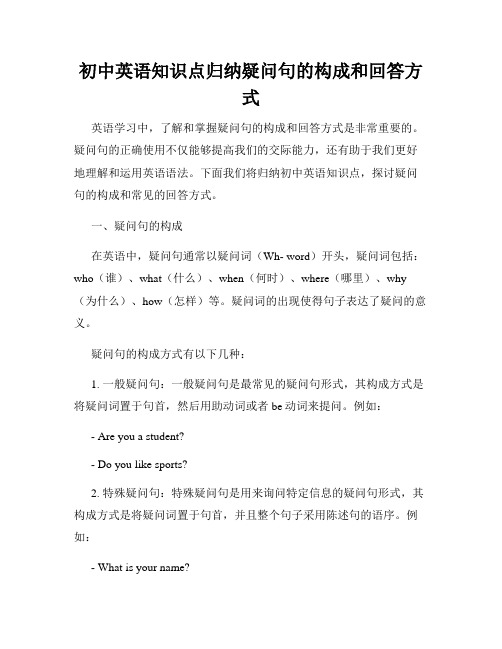
初中英语知识点归纳疑问句的构成和回答方式英语学习中,了解和掌握疑问句的构成和回答方式是非常重要的。
疑问句的正确使用不仅能够提高我们的交际能力,还有助于我们更好地理解和运用英语语法。
下面我们将归纳初中英语知识点,探讨疑问句的构成和常见的回答方式。
一、疑问句的构成在英语中,疑问句通常以疑问词(Wh- word)开头,疑问词包括:who(谁)、what(什么)、when(何时)、where(哪里)、why (为什么)、how(怎样)等。
疑问词的出现使得句子表达了疑问的意义。
疑问句的构成方式有以下几种:1. 一般疑问句:一般疑问句是最常见的疑问句形式,其构成方式是将疑问词置于句首,然后用助动词或者be动词来提问。
例如:- Are you a student?- Do you like sports?2. 特殊疑问句:特殊疑问句是用来询问特定信息的疑问句形式,其构成方式是将疑问词置于句首,并且整个句子采用陈述句的语序。
例如:- What is your name?- Where do you live?3. 选择疑问句:选择疑问句是用来两者或多者做出选择的疑问句形式,其构成方式是在一般疑问句的基础上,在疑问句末尾加上一个或多个选择项,常用or来连接。
例如:- Would you like tea or coffee?- Do you prefer playing football or basketball?4. 反义疑问句:反义疑问句是用来提出疑问并征求对方确认或否定的疑问句形式,其构成方式是在主句后面加上一个由动词、助动词或情态动词引导的疑问句。
例如:- You can swim, can't you?- He is from England, isn't he?二、回答方式对于不同类型的疑问句,回答方式也有所不同。
下面让我们来具体了解一下各类型疑问句的回答方式:1. 一般疑问句:对于一般疑问句,回答方式有两种:肯定回答和否定回答。
初中英语-疑问句(一般疑问句、特殊疑问句) PPT课件 图文
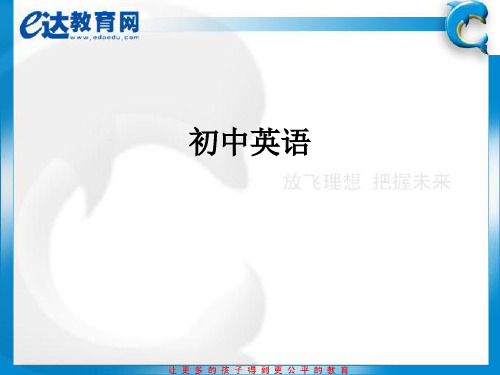
• 2.Chinese New Year this year is in February. When is Chinese New Year?
• 3.Kitty is wearing a special costume. Who is wearing a special costume?
which----Thing or person (对特定的人或事物提问)。
e.g “Which man is your English teacher?” “哪位是你的英 语老师?” “The man in white.” “那个穿着白衣服的。”
who----Person (对人提问)
e.g “Who will visit you tomorrow?” “My father.” “明天谁来看你?” “我爸爸。”
1.She is a pupil. Is she a pupil?
2. 她 是 学生。 是 她 学生 ?
2. I can see a star. Can you see a star?
3. My mother is a teacher.
Is your mother a teacher? 4. It will rain this afternoon.
flowers for your teachers?
Susan: No, I didn’t buy __a_n_y_ flowers, but I bought _so__m_e__ cards. Look!
Tom: Wow, how beautiful they are. Where did you buy them?
初中英语疑问句的构成及用法归纳大全
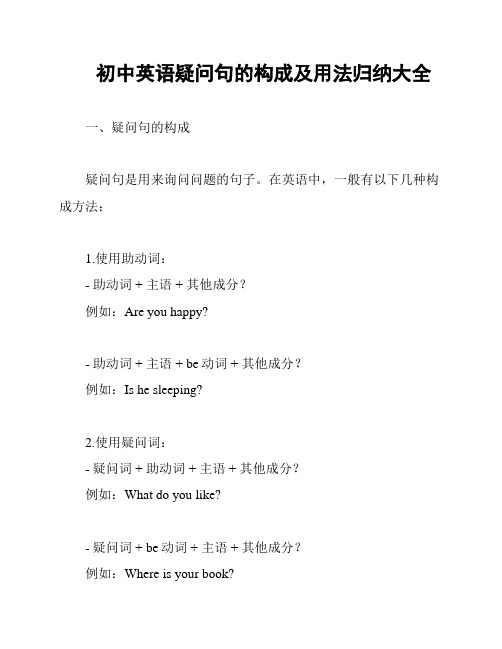
初中英语疑问句的构成及用法归纳大全一、疑问句的构成疑问句是用来询问问题的句子。
在英语中,一般有以下几种构成方法:1.使用助动词:- 助动词 + 主语 + 其他成分?例如:Are you happy?- 助动词 + 主语 + be动词 + 其他成分?例如:Is he sleeping?2.使用疑问词:- 疑问词 + 助动词 + 主语 + 其他成分?例如:What do you like?- 疑问词 + be动词 + 主语 + 其他成分?例如:Where is your book?3.使用倒装句:- 倒装助动词 + 主语 + 谓语?例如:Can he swim?- 倒装be动词 + 主语?例如:Is she a teacher?二、常见疑问词的用法疑问词是用来引导疑问句的特殊词汇。
以下是一些常见的疑问词及其用法:1. Who:询问人的身份、特征等例如:Who is your best friend?2. What:询问事物、事实、性质等例如:What is your favorite color?3. Where:询问地点或位置例如:Where do you live?4. When:询问时间或日期例如:When is your birthday?5. Why:询问原因或目的例如:Why are you crying?6. How:询问方式、方式、程度等例如:How do you go to school?三、特殊疑问句的构成特殊疑问句是由疑问词引导的疑问句,对整个句子提问。
按照特殊疑问词的不同,构成方法也有所区别:1. 对主语提问:- 疑问词 +be动词 + 主语 + 其他成分?例如:Who is the best student in the class?2. 对宾语提问:- 疑问词 + 助动词 + 主语 + 动词 + 其他成分?例如:What does he like to eat?3. 对地点、时间、原因等提问:- 疑问词 + 助动词 + 主语 + 谓语 + 其他成分?例如:Where did you go last weekend?四、陈述句转换为疑问句将陈述句转换为疑问句时,可以通过改变语序或添加助动词来完成。
初中英语知识点归纳疑问句的构成与转换
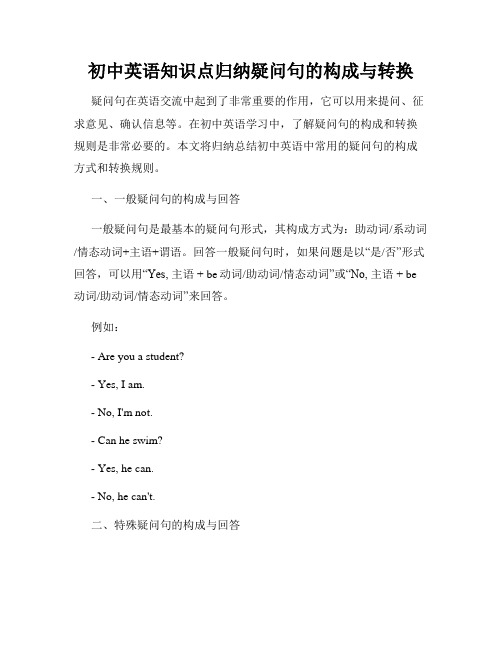
初中英语知识点归纳疑问句的构成与转换疑问句在英语交流中起到了非常重要的作用,它可以用来提问、征求意见、确认信息等。
在初中英语学习中,了解疑问句的构成和转换规则是非常必要的。
本文将归纳总结初中英语中常用的疑问句的构成方式和转换规则。
一、一般疑问句的构成与回答一般疑问句是最基本的疑问句形式,其构成方式为:助动词/系动词/情态动词+主语+谓语。
回答一般疑问句时,如果问题是以“是/否”形式回答,可以用“Yes, 主语 + be动词/助动词/情态动词”或“No, 主语 + be 动词/助动词/情态动词”来回答。
例如:- Are you a student?- Yes, I am.- No, I'm not.- Can he swim?- Yes, he can.- No, he can't.二、特殊疑问句的构成与回答特殊疑问句用于询问某个具体的信息,其构成方式为:特殊疑问词+一般疑问句的构成规则。
我们常用的特殊疑问词有:who, what, where, when, why, how等。
例如:- What is your name?- My name is John.- Where do you live?- I live in Beijing.- When is your birthday?- My birthday is on November 10th.- Why are you late?- Because there was traffic jam.- How do you go to school?- I go to school by bus.三、选择疑问句的构成与回答选择疑问句用于提供选项,并询问对方在这些选项中做出选择。
其构成方式为:疑问词+助动词/情态动词+主语+谓语+其他信息。
例如:- Which color do you like, red or blue?- I like blue.- Do you want tea or coffee?- I want coffee.四、反义疑问句的构成与回答反义疑问句用于提出对原句的肯定或否定的相反意见,并询问对方是否同意。
初中英语疑问句知识点
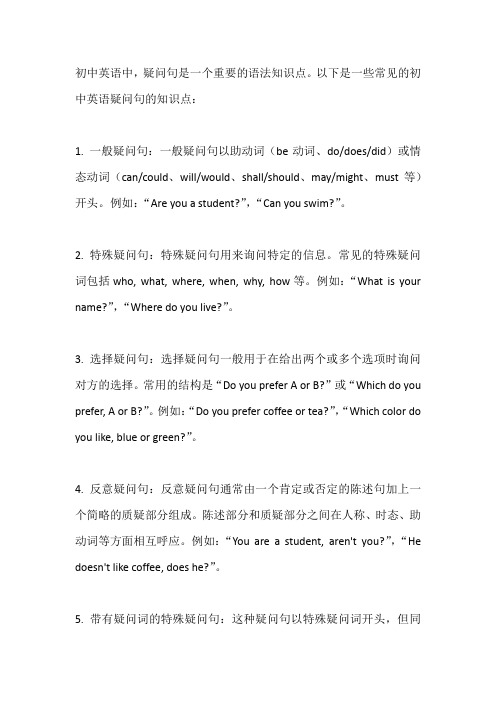
初中英语中,疑问句是一个重要的语法知识点。
以下是一些常见的初中英语疑问句的知识点:1. 一般疑问句:一般疑问句以助动词(be动词、do/does/did)或情态动词(can/could、will/would、shall/should、may/might、must等)开头。
例如:“Are you a student?”,“Can you swim?”。
2. 特殊疑问句:特殊疑问句用来询问特定的信息。
常见的特殊疑问词包括who, what, where, when, why, how等。
例如:“What is your name?”,“Where do you live?”。
3. 选择疑问句:选择疑问句一般用于在给出两个或多个选项时询问对方的选择。
常用的结构是“Do you prefer A or B?”或“Which do you prefer, A or B?”。
例如:“Do you prefer coffee or tea?”,“Which color do you like, blue or green?”。
4. 反意疑问句:反意疑问句通常由一个肯定或否定的陈述句加上一个简略的质疑部分组成。
陈述部分和质疑部分之间在人称、时态、助动词等方面相互呼应。
例如:“You are a student, aren't you?”,“He doesn't like coffee, does he?”。
5. 带有疑问词的特殊疑问句:这种疑问句以特殊疑问词开头,但同时也包含了一般疑问句的结构。
例如:“What time do you usually get up?”,“How often do you exercise?”。
学生在学习疑问句时需要注意以下几点:-疑问句的变换方式,如将陈述句转换为一般疑问句、特殊疑问句等;-特殊疑问词的使用及其不同的含义和用法;-语序的变化,特别是特殊疑问句中主语和谓语的位置变化。
初中英语知识点归纳疑问句和反意疑问句的用法
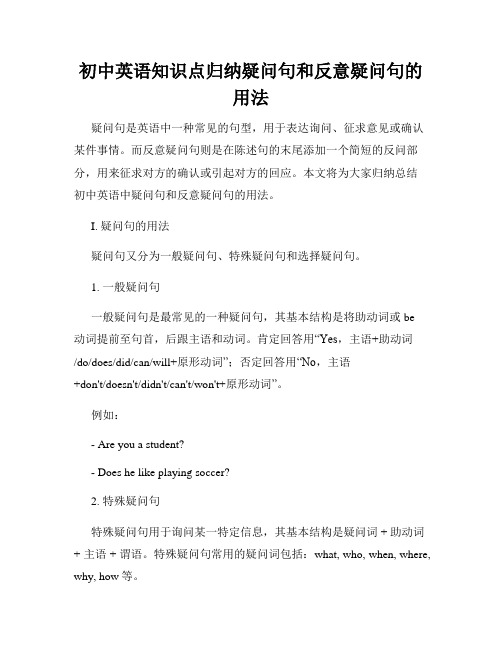
初中英语知识点归纳疑问句和反意疑问句的用法疑问句是英语中一种常见的句型,用于表达询问、征求意见或确认某件事情。
而反意疑问句则是在陈述句的末尾添加一个简短的反问部分,用来征求对方的确认或引起对方的回应。
本文将为大家归纳总结初中英语中疑问句和反意疑问句的用法。
I. 疑问句的用法疑问句又分为一般疑问句、特殊疑问句和选择疑问句。
1. 一般疑问句一般疑问句是最常见的一种疑问句,其基本结构是将助动词或be动词提前至句首,后跟主语和动词。
肯定回答用“Yes,主语+助动词/do/does/did/can/will+原形动词”;否定回答用“No,主语+don't/doesn't/didn't/can't/won't+原形动词”。
例如:- Are you a student?- Does he like playing soccer?2. 特殊疑问句特殊疑问句用于询问某一特定信息,其基本结构是疑问词 + 助动词+ 主语 + 谓语。
特殊疑问句常用的疑问词包括:what, who, when, where, why, how等。
例如:- What is your name?- Where do you live?3. 选择疑问句选择疑问句用于提供选择的问题,其基本结构是“Or”连接两个陈述句。
其中,前一陈述句用正语序,后一陈述句用部分倒装语序。
回答选择疑问句时,可以根据实际情况选择其中一个选项进行回答。
例如:- Would you like tea or coffee?- Do you prefer basketball or football?II. 反意疑问句的用法反意疑问句用于在陈述句的末尾添加反问部分,并且正反之间一般存在意义上的对立或前后关系。
基本结构为:陈述句,正反疑问句。
1. 使用助动词当陈述句中有助动词时,反意疑问句一般使用助动词的缩略形式。
例如:- You can swim, can't you?- He likes playing tennis, doesn't he?2. 使用be动词当陈述句中是be动词时,反意疑问句中使用do作为辅助动词。
初中英语句子之疑问句
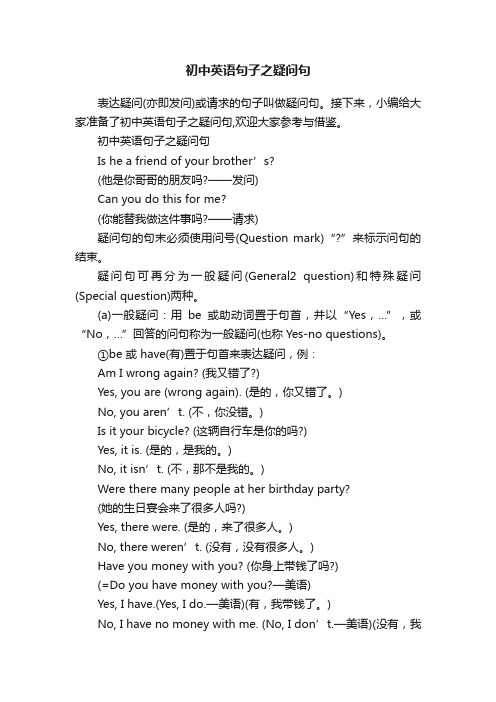
初中英语句子之疑问句表达疑问(亦即发问)或请求的句子叫做疑问句。
接下来,小编给大家准备了初中英语句子之疑问句,欢迎大家参考与借鉴。
初中英语句子之疑问句Is he a friend of your brother’s?(他是你哥哥的朋友吗?——发问)Can you do this for me?(你能替我做这件事吗?——请求)疑问句的句末必须使用问号(Question mark)“?”来标示问句的结束。
疑问句可再分为一般疑问(General2 question)和特殊疑问(Special question)两种。
(a)一般疑问:用be或助动词置于句首,并以“Yes,…”,或“No,…”回答的问句称为一般疑问(也称Yes-no questions)。
①be 或 have(有)置于句首来表达疑问,例:Am I wrong again? (我又错了?)Yes, you are (wrong again). (是的,你又错了。
)No, you ar en’t. (不,你没错。
)Is it your bicycle? (这辆自行车是你的吗?)Yes, it is. (是的,是我的。
)No, it isn’t. (不,那不是我的。
)Were there many people at her birthday party?(她的生日宴会来了很多人吗?)Yes, there were. (是的,来了很多人。
)No, there weren’t. (没有,没有很多人。
)Have you money with you? (你身上带钱了吗?)(=Do you have money with you?—美语)Yes, I have.(Yes, I do.—美语)(有,我带钱了。
)No, I have no money with me. (No, I don’t.—美语)(没有,我没带钱。
)②助动词置于句首来表达疑问,例:Shall3 I call a taxi for you ? (需要我替你叫一辆出租车吗?)Yes, please. Thank you. (好的,谢谢你。
疑问句(25张PPT)初中英语专项复习课件
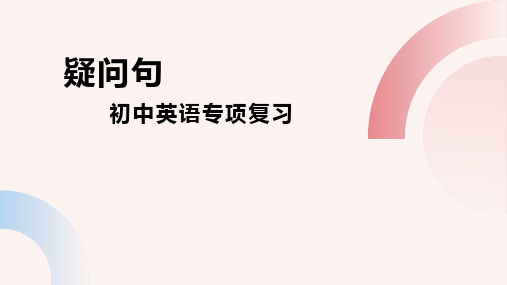
● (一)反义疑问句的两种基本句型
形式
例句
肯定陈述句+否定附加问句
The girl went home late yesterday,didn’t she?这女孩昨天回家晚,不是吗?
否定陈述句+肯定附加问句
You haven’t been to Beijing,have you?你没 去过北京,是吗?
● B.how often
● C.how soon
● ( C )8.—Daddy,
will you buy me a bendable phone (折叠手机)?
● —Oh,perhaps in a few months.
● A.how long
● B.how far
● C.how soon
● D.how often
● B.No,it isn’t
● C.No,they aren’t
● ( B )4.—Is the girl in red your friend?
●—
.She is learning Chinese now.
● A.Yes,it is
● B.Yes,she is
● C.Yes,she does
●
—I like coffee.我喜欢咖啡。
● 【典题链接】
● ( A )10.—Can you play volleyball or basketball?
●—
of them.I’m good at ball games.
● A.Both
● B.Either
● C.Neither
● D.None
● ( C )11.—When shall we go on a picnic,Saturday or Sunday?
初中英语 疑问句
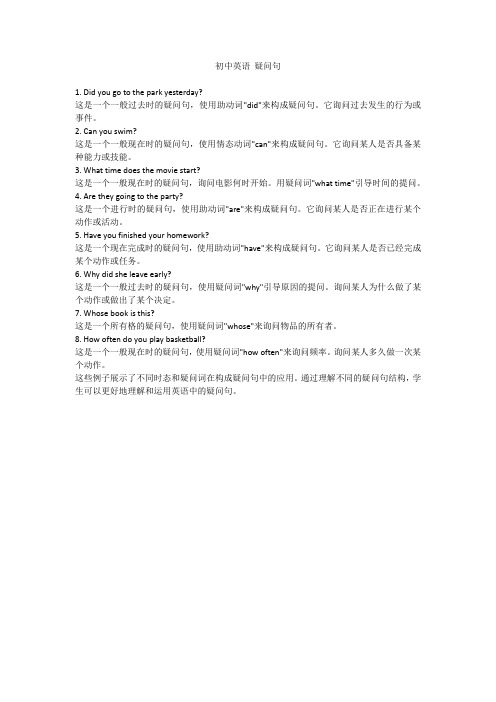
初中英语疑问句1. Did you go to the park yesterday?这是一个一般过去时的疑问句,使用助动词"did"来构成疑问句。
它询问过去发生的行为或事件。
2. Can you swim?这是一个一般现在时的疑问句,使用情态动词"can"来构成疑问句。
它询问某人是否具备某种能力或技能。
3. What time does the movie start?这是一个一般现在时的疑问句,询问电影何时开始。
用疑问词"what time"引导时间的提问。
4. Are they going to the party?这是一个进行时的疑问句,使用助动词"are"来构成疑问句。
它询问某人是否正在进行某个动作或活动。
5. Have you finished your homework?这是一个现在完成时的疑问句,使用助动词"have"来构成疑问句。
它询问某人是否已经完成某个动作或任务。
6. Why did she leave early?这是一个一般过去时的疑问句,使用疑问词"why"引导原因的提问。
询问某人为什么做了某个动作或做出了某个决定。
7. Whose book is this?这是一个所有格的疑问句,使用疑问词"whose"来询问物品的所有者。
8. How often do you play basketball?这是一个一般现在时的疑问句,使用疑问词"how often"来询问频率。
询问某人多久做一次某个动作。
这些例子展示了不同时态和疑问词在构成疑问句中的应用。
通过理解不同的疑问句结构,学生可以更好地理解和运用英语中的疑问句。
初中英语疑问句句型分类知识点讲解
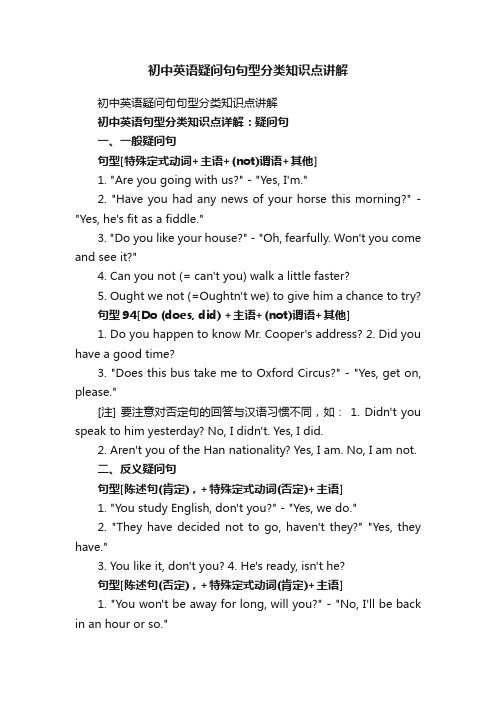
初中英语疑问句句型分类知识点讲解初中英语疑问句句型分类知识点讲解初中英语句型分类知识点详解:疑问句一、一般疑问句句型[特殊定式动词+主语+(not)谓语+其他]1. "Are you going with us?" - "Yes, I'm."2. "Have you had any news of your horse this morning?" - "Yes, he's fit as a fiddle."3. "Do you like your house?" - "Oh, fearfully. Won't you come and see it?"4. Can you not (= can't you) walk a little faster?5. Ought we not (=Oughtn't we) to give him a chance to try?句型94[Do (does, did) +主语+(not)谓语+其他]1. Do you happen to know Mr. Cooper's address?2. Did you have a good time?3. "Does this bus take me to Oxford Circus?" - "Yes, get on, please."[注] 要注意对否定句的回答与汉语习惯不同,如: 1. Didn't you speak to him yesterday? No, I didn't. Yes, I did.2. Aren't you of the Han nationality? Yes, I am. No, I am not.二、反义疑问句句型[陈述句(肯定),+特殊定式动词(否定)+主语]1. "You study English, don't you?" - "Yes, we do."2. "They have decided not to go, haven't they?" "Yes, they have."3. You like it, don't you?4. He's ready, isn't he?句型[陈述句(否定),+特殊定式动词(肯定)+主语]1. "You won't be away for long, will you?" - "No, I'll be back in an hour or so."2. "… I think I'll go into the green line. You couldn't give mea helping hand, could you, Mr. Snape?"3. "I'd like to go to Central Australia with you…. you h ave never been out of England, have you?"4. "He doesn't know anything about it, does he?" - "No, he doesn't.三、特指疑问句句型[疑问词(主语)+系词+表语]/ [疑问词(定语)+主语+行为动词+宾语]1. Who is there?2. Who gives your English lessons?3. What is in the box?4. Which is mine?5. Whose book is on the desk?6. How many students work in the workshop?7. What new products have been turned out in that factory?句型疑问词(表语/宾语/状语)+特殊定式动词+主语+行为动词…]1. Who is he?2. What is he?3. What is he like?4. What is it like?5. What kind of man is he?6. What day is today?7. What's the date today?8. What time is it now?9. How do you do?10. How are you getting along? (= how goes it with you? = how is life? = how is everything with you?11. How is your health? 12. How do you feel? 13. What's matter with you?14. Where are you going? 15. Where do you come from? 16. Where are you from?17. What's your nationality, please? 18. What family are you from?句型[疑问词+in the world/on earth/the devil/the deuce/ever等强调词语+其他]1. "What the deuce shall I write about?" - He thought.2. Whatin the world do you mean?3. Who on earth (in the world) told you that?4. Who the devil is he?5. What the deuce is the matter?6. What the dickens is it?7. Who ever wants this?四、选择疑问句句型[一般疑问句+or+一般疑问句]1. Shall we come to see you or will you come to see us?2. Are you from the South or from the North?3. Will he go on Monday or on Tuesday?4. Did you speak to them, or did the manager?5. Where's the bank? Should I go this way or that way?句型[特指疑问句,+A or B ?]1. "What would you like, Chinese or European food?" - "I don't mind one way or the other."2. Which would you rather have - steak or fish?3. Who will be your teacher, Mr. Brown or Mr. Cooper?4. Where did you spend your leave: in Shanghai or in Hangzhou?5. When will he go there, tomorrow or some other day?五、间接疑问句句型[适当的主语+疑问关联词+从句(正常语序)]1. I'd like to know how old you are.2. He inquired how it was done.3. "Guess how old I am." - "I'd say you're about twenty-three."4. I ask you what you want.5. Please advise me which book I should read first.6. Tell me why it is so important.句型[适当的`主语+if/whether+从句(正常语序)]1. I sometimes ask myself the question whether it was worththe effort.2. I ask you whether it is true or not.3. She asked if I had slept.4. Tell me whether you like it.5. He visited us next day and asked if we had got home safe.6. She inquired if he liked the post.六、双重疑问句句型一般疑问句+疑问关联词+从句(正常语序)]1. Can you tell me where he has gone?2. Have you any idea where he lives?3. May I ask you then what you would advise me to do?4. Do you know who lives here?5. Do you know when he was born?句型[疑问词+do you think/did you say/can you guess/do you suppose+其他(正常语序)]1. What will be the result, do you think?2. "How old were you then, Clyde, did you say?" "Between seventeen and eighteen."3. When do you think the meeting will be held?4. How many books, can you guess, did he buy the other day?5. What do you suppose he's hanging around here?七、修辞疑问句句型[陈述句(肯定)+反问句(肯定)]1. We're old friends, not strangers, right?2. So you've been abroad, have you?3. She's a sweet little girl, is she?4. The land reform has just reached the stage of deciding everyone's class status, so you come sucking around, do you?句型[疑问词+should+主语+动词原形+其他]1. Who should I see but my own brother?2. Who should there be?3. Why should the door be locked?4. Who/Whom should I see in the courtyard but Mr. Smith?5. "Where is Jane?" - "How should I know?"6. Why should he be angry with me?句型[Oh,/So+陈述句+反问句]1. Oh, he's here now, is he?2. Oh, you told him all about it, did you?3. So you've the luggage taken to the station, have you?4. So you're going abroad, are you?八、回响疑问句句型[A:陈述句+B:疑问句(重复A句中的部分)]1. A: I didn't like that meal. B: You didn't like it? (怀疑)2. "I'm tired." - "Are you?" (怀疑)3. A: The Browns are emigrating. B: Emigrating? (惊讶)4. A: It cost sixty dollars. B: How much did it cost? (惊讶)5. A: Switch the light off, please. B: Switch the light off, you say? / Switch what off? (反对)句型[A: 疑问句+B: 重述性疑问句]1. A: What do you think of the picture? B: What do I think of it? (怀疑)2. A: How did you enjoy the carnival? B: How did I enjoy what? (要求)3. A: How did you enjoy your holidays? B: How did I enjoy my holidays? (考虑回答)4. A: Have you borrowed my pen? B: (Have I) Borrowed your pen? (反驳)九、陈述式疑问句句型[任何陈述形式的疑问句(词序不变)]1. My friend's here?2. You wouldn't see me left here alone?3. "You followed us, then?" - "What's that to you? ..." saidJones, "Go to the devil!"4. A two million dollar building, you can't touch the walls?5. "You are not ill?" was the question put, "A little sick," replied Miss Keldar.句型[…疑问词(在剧中任何位置上)]1. "You use that position as a favorite to insult a gentleman." - "To insult a what?" said Steerforth.2. Five times what number makes twenty?3. I asked the carrier, "Are we going all the way there?" - "All the way where?" asked the carrier4. You're twenty-what (odd) this year?5. He's your who?6. Your who is a steel-worker?7. How old a child could draw this? 8. He is your son of what number?。
初中英语特殊疑问句大全
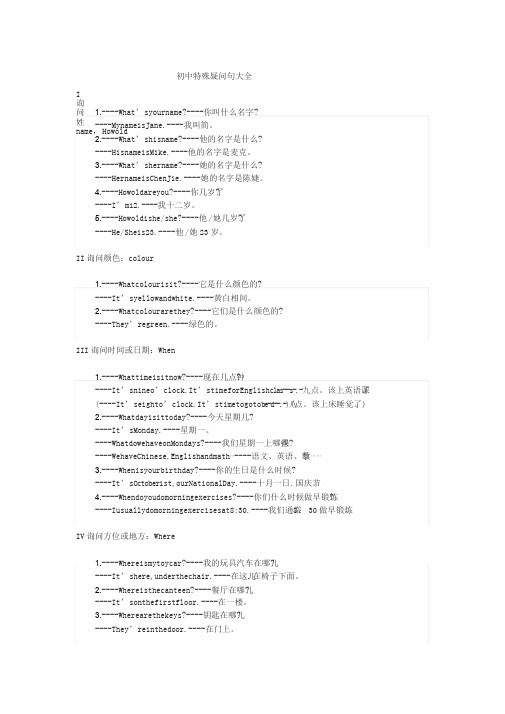
初中特殊疑问句大全I询问姓name ,Howold1.----What ’syourname?----你叫什么名字?----MynameisJane.----我叫简。
2.----What ’shisname?----他的名字是什么?----HisnameisMike.----他的名字是麦克。
3.----What ’shername?----她的名字是什么?----HernameisChenJie.----她的名字是陈婕。
4.----Howoldareyou?----你几岁了?----I ’m12.----我十二岁。
5.----Howoldishe/she?----他/她几岁了?----He/Sheis23.----他/她23岁。
II 询问颜色:colour1.----Whatcolourisit?----它是什么颜色的?----It ’syellowandwhite.----黄白相间。
2.----Whatcolourarethey?----它们是什么颜色的?----They ’regreen.----绿色的。
III 询问时间或日期:When1.----Whattimeisitnow?----现在几点钟?----It ’snineo ’clock.It ’stimeforEnglishclas--s-.-九点。
该上英语课了。
(----It ’seighto ’clock.It ’stimetogotob e -d --.-)八(点。
该上床睡觉了。
)2.----Whatdayisittoday?----今天星期几?----It ’sMonday.----星期一。
----WhatdowehaveonMondays?----我们星期一上哪些课?----WehaveChinese,Englishandmath ⋯----语文、英语、数学⋯⋯3.----Whenisyourbirthday?----你的生日是什么时候?----It ’sOctober1st,ourNationalDay.----十月一日.国庆节。
初中英语疑问句练习题
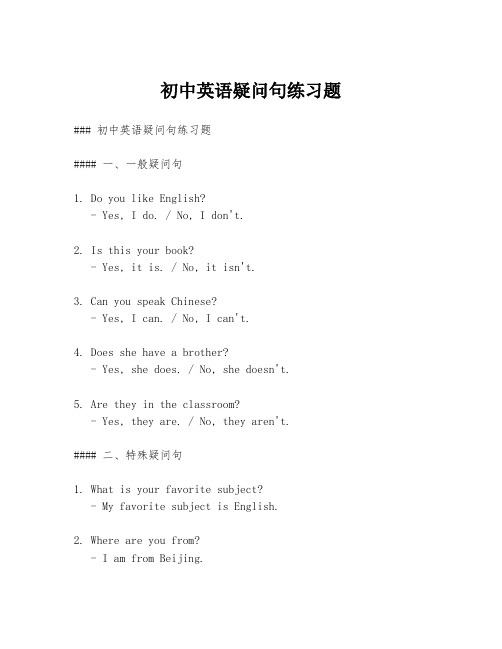
初中英语疑问句练习题### 初中英语疑问句练习题#### 一、一般疑问句1. Do you like English?- Yes, I do. / No, I don't.2. Is this your book?- Yes, it is. / No, it isn't.3. Can you speak Chinese?- Yes, I can. / No, I can't.4. Does she have a brother?- Yes, she does. / No, she doesn't.5. Are they in the classroom?- Yes, they are. / No, they aren't.#### 二、特殊疑问句1. What is your favorite subject?- My favorite subject is English.2. Where are you from?- I am from Beijing.3. When is your birthday?- My birthday is on the 5th of August.4. Who is the tallest in your class?- The tallest in my class is Tom.5. Why do you like math?- I like math because it's challenging and logical. #### 三、选择疑问句1. Do you want to play basketball or soccer?- I want to play basketball.2. Is he a teacher or a doctor?- He is a teacher.3. Can you play the piano or the violin?- I can play the piano.4. Is she your sister or your cousin?- She is my sister.5. Would you like some tea or coffee?- I would like some tea, please.#### 四、反义疑问句1. You are a student, aren't you?- Yes, I am. / No, I'm not.2. She can play the guitar, can't she?- Yes, she can. / No, she can't.3. They are at home, aren't they?- Yes, they are. / No, they aren't.4. He doesn't like apples, does he?- Yes, he does. / No, he doesn't.5. You were late for school yesterday, weren't you? - Yes, I was. / No, I wasn't.#### 五、间接疑问句1. What does he want to be when he grows up?- He wants to be a scientist.2. Where did they go on vacation last summer?- They went to Hawaii.3. When will the meeting start?- The meeting will start at 3 p.m.4. Who will give a speech at the conference?- The president of the company will give a speech.5. Why was she absent from school yesterday?- She was absent because she was sick.#### 六、连词疑问句1. Can you tell me how to get to the library, and do you know the opening hours?- Sure, go straight and turn left at the second street.The library opens at 9 a.m.2. Did you finish your homework, and are you ready for the test?- Yes, I finished my homework, and I'm well prepared forthe test.3. Do you know her phone number, and can you give it to me?- Yes, her number is 123-456-7890.4. Can you play chess, and do you want to play a game with me? - Yes, I can play chess, and I'd love to play a game with you.5. Did you enjoy the movie, and would you like to watch it again?- Yes, I enjoyed the movie, but I don't want to watch it again.通过这些练习题,学生们可以加强对英语疑问句的理解和运用,提高英语口语和书面表达能力。
初中英语-疑问句
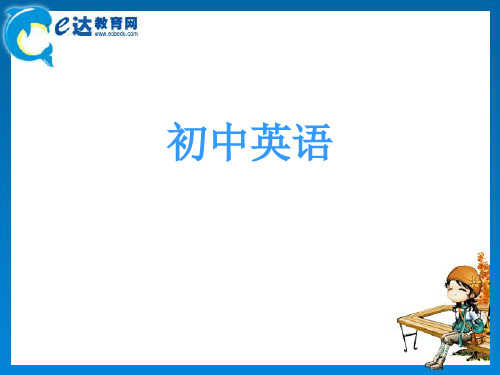
疑问句
一般疑问句
特殊疑问句
反意疑问句
一般疑问句
一般疑问句,即(yes/no)问句的改变:
1.把关键词(如:am、is、are、have、has、c称的转换。
2.有实意动词的句子改问句时,在句子开头加
“Do、Does”或“Did”,原实意动词用原型。
想想还缺了哪个疑问词呢?
1. I go to school by bus.
How do you go to school?
Let’s see the family of “how”
2. She is twelve.
How old is she?
3. Jim plays with his dog for about two hours on Sunday.
特殊疑问句
(Special question)
特殊疑问句的形式:疑问代词/副 词 + 动词 be/助动词/情态动词 + 主语 + 动词。疑问代词/副词包括 what, who, which, whom, whose, when, how, why, where 等。回 答时不用yes 或no,而要根据实际 情况回答。
1. I like English.
Do you like English?
2. Eddie played football.
Did Eddie play football?
一般疑问句的肯定回答、否定回答。
肯定回答:Yes,… +关键词。
否定回答:No,…+关键词+not.
1.Is she a pupil? Yes, she is. No, she is not./No, she isn`t. 2.Can you see a star? Yes, I can.
初中英语疑问句分类及应用知识点归纳
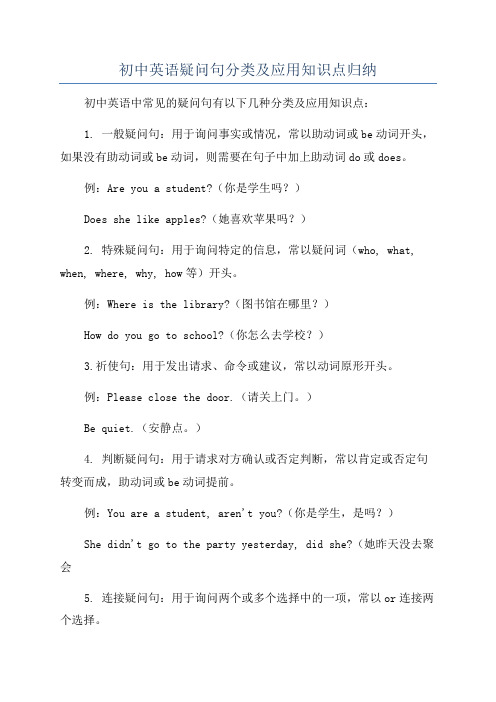
初中英语疑问句分类及应用知识点归纳初中英语中常见的疑问句有以下几种分类及应用知识点:
1. 一般疑问句:用于询问事实或情况,常以助动词或be动词开头,如果没有助动词或be动词,则需要在句子中加上助动词do或does。
例:Are you a student?(你是学生吗?)
Does she like apples?(她喜欢苹果吗?)
2. 特殊疑问句:用于询问特定的信息,常以疑问词(who, what, when, where, why, how等)开头。
例:Where is the library?(图书馆在哪里?)
How do you go to school?(你怎么去学校?)
3.祈使句:用于发出请求、命令或建议,常以动词原形开头。
例:Please close the door.(请关上门。
)
Be quiet.(安静点。
)
4. 判断疑问句:用于请求对方确认或否定判断,常以肯定或否定句转变而成,助动词或be动词提前。
例:You are a student, aren't you?(你是学生,是吗?)
She didn't go to the party yesterday, did she?(她昨天没去聚会
5. 连接疑问句:用于询问两个或多个选择中的一项,常以or连接两个选择。
例:Do you like apples or oranges?(你喜欢苹果还是橙子?)。
疑问句知识点详解(初中英语专项复习)4

疑问句知识点详解(初中英语专项复习)考向一:一般疑问句英语中的疑问句分为一般疑问句、特殊疑问句、选择疑问句和反意疑问句四种。
所谓一般疑问句,就是可以用yes或no来回答的疑问句。
1. 肯定形式的一般疑问句此类一般疑问句的结构为"连系动词be/助动词/情态动词+ 主语+ 动词原形+ 其他? "。
—Is he a good student? 他是一个好学生吗?—Yes, he is. 是的,他是。
/ No, he isn’t. 不,他不是。
—Does he go to school by bike? 他骑自行车去上学吗?—Yes, he does. 是的,他骑。
/ No, he doesn’t. 不,他不骑。
【典例】— Are there any notebooks on COVID-19 (新冠肺炎病毒) in your school?— _______. They tell us how to protect ourselves in this big event.A. Yes, they areB. Yes, there areC. Yes, there isD. Yes, it is【答案】B【解析】考查there be句型。
句意:——你们学校有新冠肺炎病毒的笔记本吗?——是的,有。
它们告诉我们在这个大事件中如何保护自己。
Are there…句式的答语:Yes, there are. /No, there aren’t. 故选B。
2. 否定形式的一般疑问句此类一般疑问句主要表示反问或惊讶,通常在连系动词be,情态动词或助动词后加not的缩略式n’t,并放在句首。
—Aren’t you a writer? 难道你不是作家吗?—No, I’m not. 是的,我不是。
【注意】在这样的句子中,要注意句子的翻译,yes翻译成"不",no翻译成"是的"。
【典例】—What a fine day!Let’s go for a picnic, _______ ?—Sounds like a good idea.A. shall weB. don’t weC. can we【答案】A【解析】考查反意疑问句。
- 1、下载文档前请自行甄别文档内容的完整性,平台不提供额外的编辑、内容补充、找答案等附加服务。
- 2、"仅部分预览"的文档,不可在线预览部分如存在完整性等问题,可反馈申请退款(可完整预览的文档不适用该条件!)。
- 3、如文档侵犯您的权益,请联系客服反馈,我们会尽快为您处理(人工客服工作时间:9:00-18:30)。
“这是谁的书?” “是我弟弟的。” ➢ when----Time (对时间提问) e.g “When will you finish your homework?”
1.Is she a pupil? Yes, she is. No, she is not./No, she isn`t.
2.Can you see a star? Yes, I can. No, I can not./No, I can`t.
3. Do you like English.
Yes, I do. No, I do not./No, I don`t.
Will it rain this afternoon?
1. I like English. Do you like English?
2. Eddie played football. Did Eddie play football?
一般疑问句的肯定回答、否定回答。
肯定回答:Yes,… +关键词。 否定回答:No,…+关键词+not.
We use ‘wh-’ questions to ask for information about someone/something.
what----activity or thing which----thing or person who----person whose----possession when----time where----place why-----reason
1.She is a pupil. Is she a pupil?
她 是 学生。 是 她 学生 ?
2. I can see a star. Can you see a star?
3. My mother is a teacher.
Is your mother a teacher? 4. It will rain this afternoon.
that time?
• Mum: It’s very cold.
• Millie: W__h_e_re_are we going to stay in Harbin?
• Mum: In Grandma’s big house.
• Millie: _W_h_a_t_does Grandma like eating?
I am reading. I’d like this red one. He is our teacher. The bag is mine. My birthday is on 2nd May. My pen is in the pencil case. I like dancing because it is fun.
• Mum: She likes biscuits very much.
• Millie: _W__h_y _do we need that big bag?
• Mum: Because we need to take lots of things
to Harbin.
B Asking ‘wh-’ questions
➢ which----Thin.g “Which man is your English teacher?” “哪位是你的英 语老师?” “The man in white.” “那个穿着白衣服的。”
➢ who----Person (对人提问)
e.g “Who will visit you tomorrow?” “My father.” “明天谁来看你?” “我爸爸。”
Try to complete the dialogue
• Millie: _W__h_e_n_are we going to Harbin?
• Mum: On 10th February.
• Millie: _W__h_at__ is the weather like in Harbin at
•
4. Did Eddie play football?
Yes, he did. No, he did not./No, he didn`t.
特殊疑问句
(Special question)
特殊疑问句的形式:疑问代词/副 词 + 动词 be/助动词/情态动词 + 主语 + 动词。疑问代词/副词包括 what, who, which, whom, whose, when, how, why, where 等。回 答时不用yes 或no,而要根据实际 情况回答。
初中英语
疑问句
一般疑问句 特殊疑问句 反意疑问句
一般疑问句
一般疑问句,即(yes/no)问句的改变: 1.把关键词(如:am、is、are、have、has、can
will等)放在句子的开头,句尾改为“?”但要 注意一、二人称的转换。 2.有实意动词的句子改问句时,在句子开头加 “Do、Does”或“Did”,原实意动词用原型。
➢ what----Activity or thing (对行为和事物提问)。
e.g . 1. “What are you talking about?” “你们在谈什么?” “We are talking about our family.” “我们在谈论我
们 的家庭情况。” 2. “What is your name?” “你叫什么名字?” “My name is Wang Li.” “我叫王丽。”
“你什么时候能完成作业?” “Tomorrow.” “明天。”
➢ where----Place (对地点提问) e.g “Where do you study?” “你在哪儿读书?”
“In Shanghai.” “在上海。”
➢ why-----reason (对原因提问) e.g “Why are you late?” “你为什么迟到?”
